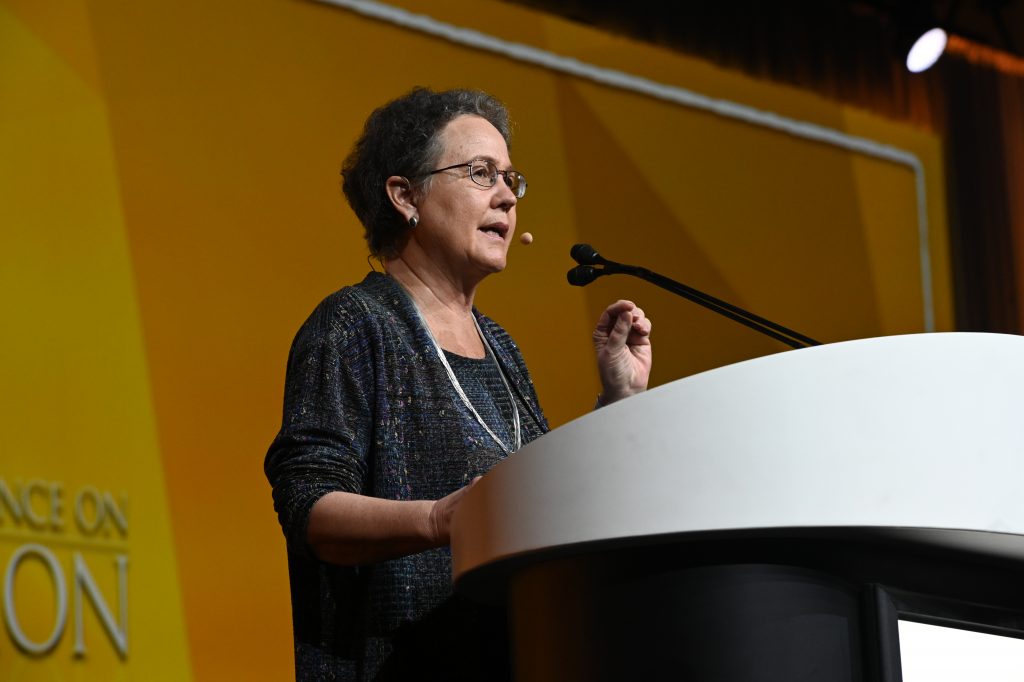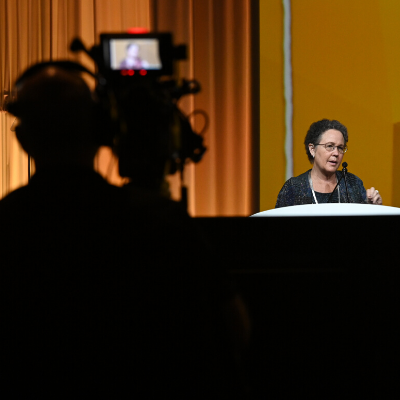“We are not born smart or dumb,” education expert Linda Darling-Hammond told a crowded 2nd General Session on Friday at AASA’s 2020 national conference in San Diego. “Neuroscience has found that children’s brains grow with rich experiences. … I’m happy to say that’s true for adults, too.”
During her stage presentation, Darling-Hammond, president and CEO of the Learning Policy Institute in Palo Alto, Calif., provided a deeper understanding of neuroscience and how engagement boosts brain development.
Babies will make a concerted effort to respond to conversation, even when only weeks old. To demonstrate, Darling-Hammond showed a short video of a “conversation” between her grandchild and her daughter. A few seconds after the daughter asked her baby a question, the baby’s furrowed brow would relax a bit and the baby would make a sentence of gurgles. The baby was making an effort to communicate, Darling-Hammond said.
“Brain development is enhanced by mental activity, positive social interaction, emotional and cultural support, a rich environment and mindfulness,” Darling-Hammond said.
While Darling-Hammond acknowledged that superintendents are working on making schools more welcoming, the work is far from done. Neuroscience informs us that stressful environments actually impede learning. Teachers may care about students, but if students are changing class every 40 minutes there is no time for a quick conversation.
Some schools lock their doors at 8:05 a.m. The students most likely impacted by this practice are those who rely on a bus to get to school, and among them, children who are ethnic minorities. The school’s practices make these children feel unimportant. In high school, her daughter found the 2,400-student school stressful because she had asthma and had trouble making it from one end of the school to another with only a five-minute passing period. At her new public school, only 500 students attended and the school culture was friendly and accommodating.
Darling-Hammond’s point was that teachers were caring at both schools, but the structure of the day and policies were hurting relationships.
In Finland, teachers have a master’s degree, a cohort, and mentors with a Ph.D. They also go through professional development in cultural competency if their class includes three or more children of a different culture. Diversity is accepted in schools. Students become fluent in English, Arabic and Finnish.
Social identity is important to students and can be reinforced at schools in a positive way or make students feel left out. A study shows that it’s not enough to be a great teacher. Teachers need to know students’ interests so they can connect with students share common understanding of student behavior, fewer disciplinary actions follow and less implicit bias is the result.
In closing, Darling-Hammond provided for thought by repeating the wisdom of John Hattie: “’Feedback is most important if it’s from the student to the teacher.’”
(Liz Griffin is senior reporter for Conference Daily Online and managing editor of School Administrator.)


